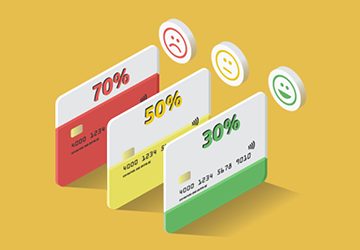How to Build and Maintain Good Credit
If you're concerned about your financial situation, you must improve your credit score. An excellent financial profile increases your likelihood of getting approved for a card and getting the best interest rates on a range of credit products. However, building a good reputation takes time. Instead, you must continually demonstrate prudent banking behaviour, such as paying your bills on time and minimizing debt.

There are many strategies to improve and ensure your financial performance, such as opening financial accounts early and combining multiple loans into one. This article provides essential tips for improving and maintaining your credit rating.
Obtain a Bank Card Early
The sooner you document your responsible spending habits, the easier it will be to improve your credit score. Getting a credit card early is one of the easiest ways to formalize financial decisions. Once you get the card, develop solid spending and transaction habits to improve your credit score continually.
Realize that bank cards can positively and negatively affect your financial history. If used wisely, they can improve your rating, but they can also lead to overspending or debt accumulation, which can negatively impact your rating.
Pay your bills on time
The main factor that affects your credit score is the amount of your timely payments. Two critical factors in building creditworthiness are keeping outstanding debt levels low and making timely repayments. Your loan repayment history primarily affects your credit score. Whether you make your payments on time or late, miss a monthly loan payment or give up on your loan, these factors determine your credit score.
Paying off the fee in full every month is a wise decision to avoid potential late payment penalties, APR, and interest charges that typically come with carrying a balance. Before opening a financial account, you should understand your goals and how you can use them to pay off outstanding debt.
Set up recurring payments for at least a month to avoid unnecessary hassles. You can initiate push, SMS or email notifications through your financial services provider.
Reduce Your Debts
Your loans, which include the amount of the initial loan that you still need to pay off on secured loans like a mortgage or auto loan, are factored into your lending rating. When it comes to types of financing, you'll likely see the amount owed on your bank cards and other revolving accounts, assuming you pay your bills on time.
It also considers how much money you have available and how much you owe. Suppose you have three bank cards, and the cash limit of each bank card is 10,000 yuan. Your balance is ten per cent of your credit card debt or three thousand dollars.
Keep utilization low
As your debt increases, your credit rating will decline over time. In addition to your billing history, your utilization level or balance-to-limit ratio is another vital evaluation element. Add up all your credit card balances and divide that total by your total credit limit across all cards to find your usage ratio. Any imbalance can lead to degraded results, but this will likely happen more quickly at utilization above 30% because failure is more likely.

Take advantage of alerts set by your card sponsor, for example, when your account balance exceeds a certain amount, when you're approaching your available amount or when you're struggling to be accountable for the proportion of your financial resources you're using. If you're willing to pay your monthly bill, you can also contact your card issuer and request an increase in your loan amount.
Limit new account applications
When it comes to creating credit, sometimes more is better. Opening too many accounts at once can lower your rating with a lender and make you appear at a greater risk. Whether your application is accepted or rejected, inquiries will be made to your credit history when you apply for a loan. It could cause your financial situation to drop by five percentage points only to improve again a few months later.
Even though one credit inquiry is unlikely to lower your score, the impact increases if you apply for multiple cards quickly. If you want to open multiple credit accounts, consider opening them gradually rather than opening them all in one month. It is not recommended to apply for multiple cards simultaneously, even if the number of cardholders is manageable.
Review your financial statements.
Review your financial
reports regularly to make sure there are no warning signs. Consumer reporting organizations can provide free copies of your financial reports upon request. Please use your legally required free annual financial report and carefully check for anomalies. To ensure the accuracy of your reports, correct any errors immediately by communicating with your lender and reporting agency.
Please be aware of inaccurate information, especially details about accounts you still need to open. The best ways to improve your credit score are to make your payments on time, keep card balances low, and keep various financial lines open.
Conclusion
In summary, if you use your money wisely, your chances of maintaining a good rating and improving your financial rating are greater; this includes having a balanced bank account portfolio, monitoring your finances, and making regular and timely payments.
Being careful with your finances and remaining up to date on loan conditions are essential to establishing and preserving a favourable lending rating. By following these tips and adopting effective financial practices, you can set yourself up for success and achieve your financial goals.





